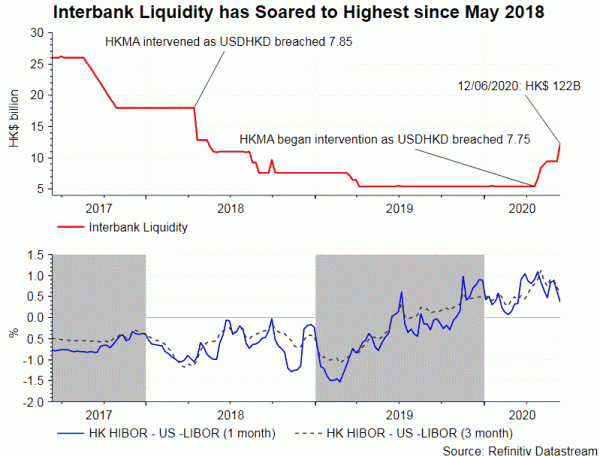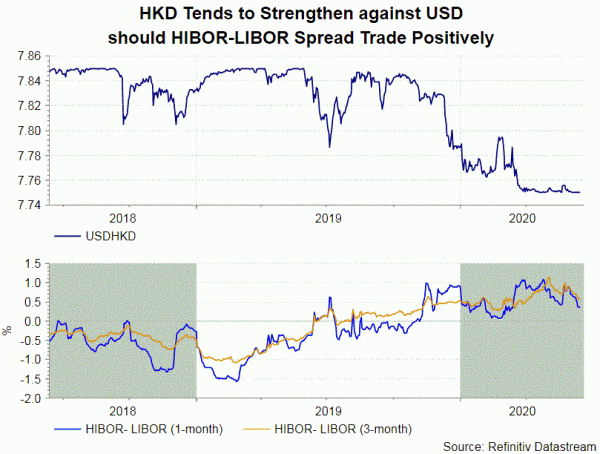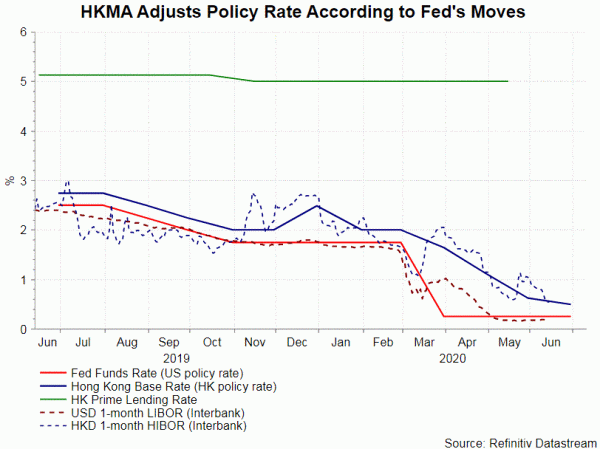Recent strength of HKD has triggered the territory’s de facto central bank, HKMA, to defend the currency system. The key reasons for strong HKD are broad-based USD weakness, HIBOR-LIBOR spread, semiannual settlement and IPO activities in Hong Kong. Policy uncertainty has taken a backseat as the US government is ridden by mass scale protests and new surge in coronavirus cases. In the longer-run, we believe the loss of special status in Hong Kong is detrimental to HKD and the linked exchange rate system.
USDHKD breached 7.75, the strong side convertibility undertaking, almost every day in the past week. This triggered HKMA’s intervention in order to defend the linked exchanged rate system. It is reported that the de facto central bank has sold HKD and simultaneously bought USD in the market for 11 times in the first two weeks of this month. The aggregate balance has been increased to HK$122B, highest in over 2 years, as of June 12.
 US dollar has been weak against major currencies over the past months. The DXY index has fallen -2.6% in the 6 weeks from end-April. The market sentiment has picked up as the coronavirus pandemic in major economies is under control. Investors also expect that economic recovery will gather momentum as countries loosen restrictive measures. The Fed has kept the policy rate at historical low of 0-025%. At the June FOMC meeting, it also pledged to, “over coming months”, “increase its holdings of Treasury securities and agency residential and commercial mortgage-backed securities at least at the current pace”. Low US yield as a result of the Fed’s expansionary measures have kept HIBOR-LIBOR spread positive, causing capital to flow into Hong Kong from the US. IPO margin financing also kept HKD strong over the past month. We expect this factor is fading away after listing of Netease on June 11 and JD.com, the largest IPO this year in terms of market cap, on June 18.
US dollar has been weak against major currencies over the past months. The DXY index has fallen -2.6% in the 6 weeks from end-April. The market sentiment has picked up as the coronavirus pandemic in major economies is under control. Investors also expect that economic recovery will gather momentum as countries loosen restrictive measures. The Fed has kept the policy rate at historical low of 0-025%. At the June FOMC meeting, it also pledged to, “over coming months”, “increase its holdings of Treasury securities and agency residential and commercial mortgage-backed securities at least at the current pace”. Low US yield as a result of the Fed’s expansionary measures have kept HIBOR-LIBOR spread positive, causing capital to flow into Hong Kong from the US. IPO margin financing also kept HKD strong over the past month. We expect this factor is fading away after listing of Netease on June 11 and JD.com, the largest IPO this year in terms of market cap, on June 18.
Political uncertainty has taken a backseat. In light of Chinese Communist Party’s plan to import new national security legislation in Hong Kong, US President Donald Trump held a press conference on May 30 announced that “Hong Kong is no longer sufficiently autonomous to warrant the special treatment that we have afforded the territory since the handover” and the US would “begin the process of eliminating policy exemptions” for Hong Kong. While details are lacking, the US could ultimately apply the same export control regime to Hong Kong as to mainland China (including dual-use technologies. Meanwhile, Trump also suggested that the US would “take action to revoke Hong Kong’s preferential treatment as a separate customs and travel territory from the rest of China”, a pathway to an eventual convergence to mainland China tariff levels. Impacts on stock market and HKD have so far been limited. Indeed, the above measures are conditional to China’s enactment of the national security law in Hong Kong. It is believe that China will hammer out the details of the laws to be imposed starting June 18. Responses of the US and other countries are the key.


